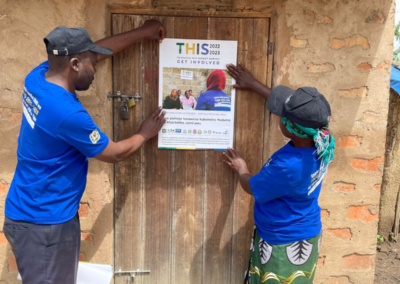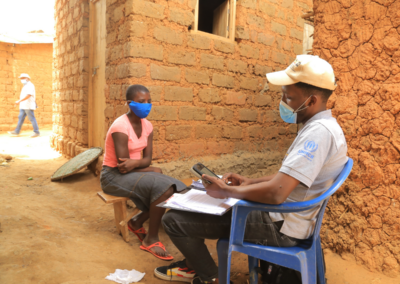Press Release
Ministry of Health Launches National Survey to Measure the Reach and Impact of Rwanda’s HIV Programs
Rwanda Population-based HIV Impact Assessment (RPHIA) will survey 10,800 households across Rwanda.
Kigali, October 10, 2018
The Ministry of Health announced today the launch of the Rwanda Population-based HIV Impact Assessment (RPHIA). The national household-based survey will measure the reach and impact of Rwanda’s HIV prevention, care, and treatment services across the country. RPHIA is led by the Ministry of Health through the Rwanda Biomedical Centre and the Ministry of Economic Planning and Finance through the National Institute of Statistics of Rwanda in coordination with ICAP at Columbia University and the U.S. Centers for Disease Control and Prevention and support from the U.S. President’s Emergency Plan for AIDS Relief.
“Data collected from RPHIA will provide critical insights on the successes and challenges Rwanda faces in confronting the HIV epidemic. RPHIA participants will benefit from free and confidential HIV testing, counseling, and treatment referrals.”
RPHIA will begin collecting household data on October 12th, 2018 in the Northern Province. The survey is anticipated to last through February 2019. Over the course of five months, trained survey personnel will visit approximately 10,800 randomly selected households and collect demographic, clinical, and behavioral information from consenting participants. Staff will also perform HIV and hepatitis B and C testing.
Results from HIV and hepatitis B virus tests will be returned to participants on the same day, and RPHIA will provide viral load testing for those who test HIV positive. Viral load suppression is a count of how much HIV virus is in the blood and can show if treatment is being used effectively. Participants who test positive for HIV and those selected for hepatitis B and C testing will be referred to health facilities of their choice for further follow up: to receive further counseling and HIV treatment, to receive the vaccine or treatment for hepatitis B, and to receive hepatitis C test results.
The Ministry of Health has led a systematic and sustained response to the HIV epidemic, which includes education on preventing HIV infection as well as universal access to effective HIV medications. Rwanda has intensified HIV testing and treatment strategies and prioritized evidence-based interventions with the goal of achieving epidemic control by 2020.
RPHIA aims to estimate new HIV infections (incidence), number of people living with HIV (prevalence), and viral load suppression among adults and adolescent children. Data collection, laboratory services, and data management will be provided by the Rwanda Biomedical Center in collaboration of the National Institute of Statistics of Rwanda and Westat, Inc. RPHIA includes technical assistance at the national level to strengthen data collection systems, enhance laboratory infrastructure, and strengthen local human resource capacity.
RPHIA will help health authorities and policymakers better understand the impact of HIV on everyone in the population, not only people living with HIV but also their family, friends, and the community at large. The success of the survey and the accuracy of the findings depend on the voluntary participation of all selected households and individuals. The Ministry of Health encourages local leaders, religious leaders, and the press to encourage people, congregations, and followers to consider participating in RPHIA if selected; and to portray a positive and accurate picture of the RPHIA survey to the public.
“RPHIA survey personnel have been extensively trained and are ready to implement a successful survey. It is the mission of all researchers to treat participants with respect, keep their personal information confidential, and ensure they have a positive experience with this important endeavor.”
###
ICAP at Columbia University
ICAP was founded in 2003 at Columbia University’s Mailman School of Public Health. A global leader in HIV, tuberculosis, other health threats, and health systems strengthening, ICAP provides technical assistance and implementation support to governments and non-governmental organizations. More than 2.2 million people have received HIV care through ICAP-supported programs, and over 1.3 million have received antiretroviral therapy through such support.
CONTACTS:
Curran Kennedy
ICAP at Columbia University
ck2878@columbia.edu










